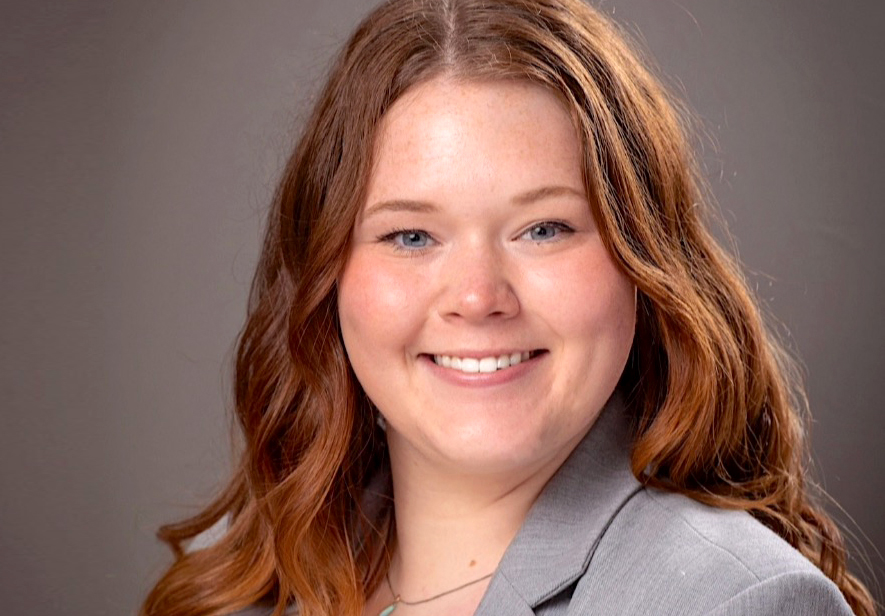Public Health Buckeyes: Nicole Vavro
Master of Health Administration student strives to make an impact for all patients

After earning a bachelor’s degree in public health at the University of Cincinnati, Nicole Vavro, a second-year Master of Health Administration student became passionate about reducing barriers in the health care after working as an addiction navigator for AmeriCorps.
Question and Answer
Why did you decide to pursue health administration at Ohio State?
During my time at AmeriCorps, I was exposed to the clinical and structural inequities in health care and became interested in ways to make an impact in this space. I met administrators who introduced me to the health administration side of public health — I never knew I was interested in topics like health policy and operations until I encountered them in this role.
Deciding to pursue an MHA has been one of the best decisions I’ve made and has challenged me to strengthen my business and leadership skills. The students and faculty here at Ohio State make the program incredible — they’re some of the most genuine people I’ve encountered. The cohort of students we have includes incredibly talented and remarkable people who I am lucky to have as lifelong friends. When interviewing for MHA programs I could sense this program had some special people, and it stood out from the other programs without a doubt.
Are you involved in any professional, academic or student activities?
I currently serve as the president the Association for Future Healthcare Executives (AFHE), a professional organization for graduate students in health care, public health, business, law and medicine. AFHE also runs Ohio State’s First-Year Health Care Case Competition. Outside academia, I work in business operations management for the Institute of Genomic Medicine at Nationwide Children’s Hospital, and I’m also a commissioner for the Ohio Commission on Service and Volunteerism, which oversees AmeriCorps programs in Ohio.
How have these experiences enriched your time at Ohio State?
AFHE has furthered my professional development and my relationships with students and faculty in the MHA program. Assisting with the case competition last year was an amazing experience. It was fascinating planning an event with teams from all over the country while ensuring the virtual format was executed in a way that compared to our usually massive in-person competition. AFHE has also helped me network with alumni of the program. I never knew how huge our reach is — we have so many alumni in so many cool places.
Any advice for incoming students?
Challenge yourself to get involved and participate, even if other students aren’t. It opens doors for new opportunities and makes your experience more meaningful. Also, learn how to manage your time. This program has definitely forced me to stop procrastinating and learn how to have more of a school-work-life balance.
How do you see your education shaping your future?
My Ohio State education has already begun shaping my future. The professors have challenged me to think more critically about the world. I think many students hope to change the world with a graduate degree, but while here I’ve learned that just doing what you’re passionate about and moving the needle a little is still a great success. The professors have also taught me to really think about who is affected by each decision you make as a leader. Making decisions for your own gain, political reasons or even based on data can have detrimental effects for other people.
What do you hope for the future of public health?
I hope people stop politicizing public health. It’s become more about what side of the aisle you align with rather than making informed decisions about your health and protecting others around you. As great as it is that public health is at the forefront of conversations around the world, it needs to stay at the front and continue to receive funding, recognition and validity. A lot of people had no idea (some still don’t) what public health is and how we’ve been working in the background to keep people healthy.
I want public health workers to continue to help people live healthier lives. COVID isn’t going to be the last public health emergency we see, so my hope is that the field continues to receive the recognition it deserves.
About The Ohio State University College of Public Health
The Ohio State University College of Public Health is a leader in educating students, creating new knowledge through research, and improving the livelihoods and well-being of people in Ohio and beyond. The College's divisions include biostatistics, environmental health sciences, epidemiology, health behavior and health promotion, and health services management and policy. It is ranked 22nd among all colleges and programs of public health in the nation, and first in Ohio, by U.S. News and World Report. Its specialty programs are also considered among the best in the country. The MHA program is ranked 5th and the health policy and management specialty is ranked 21st.